
Do you know which animals the French love most? What about the most popular pets and common farm animals? How many species are there in the gastropod family, and what’s the life expectancy of forest-litter snails? We’re about to answer some of these questions.
As I was gathering animal names, I came up with a fascinating theory: the more exotic an animal is in France, the easier it will be for you to learn its French name. Conveniently enough, there are several animal names in French that are identical to their English equivalents: lion, crocodile, panda, koala, giraffe, jaguar… They shouldn’t give you too much trouble!
In this article, you’ll learn the names of different animals in French, from pets and farm animals to wild beasts, sea creatures, and all sorts of tiny bugs. We’ll even spice it up with some extras: French animal sounds, body parts, and a bunch of colorful expressions such as il pleut comme vache qui pisse (“it’s raining like a pissing cow”).
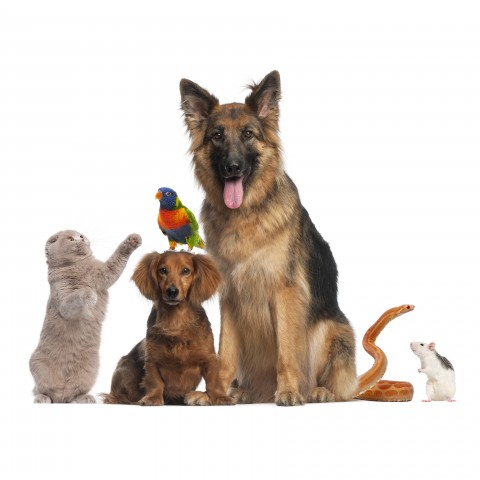
Des animaux de compagnie (“Pets”)
 Table of Contents
Table of Contents
- Pets
- Farm Animals
- Wild Animals
- Sea Animals
- Bugs
- Birds
- Reptiles & Amphibians
- Animal Body Parts
- Animal Verbs
- Animal Sounds
- Bonus: Animal Idioms
- Le mot de la fin
1. Pets
When it comes to pets, the French don’t have very eccentric tastes. Sure, you could always find domestic snakes or spiders here and there. But the all-time classics (cats and dogs) are as ubiquitous here as anywhere else in the world, with fish and birds coming next on the list.
Polls have shown that the most popular pets in France are cats (purring in around 30% of households), followed by dogs (20%), and then fish (10%). When asked about their favorite animals (and not just pets), the French still answered in favor of cats and dogs, followed by horses and dolphins.
Surprisingly, France is also the European country with the highest number of domestic reptiles, though this number is marginal compared to the number of domestic mammals.
| Un chat | “Cat” |
| Un chien | “Dog” |
| Un lapin | “Rabbit” |
| Une souris | “Mouse” |
| Un rat | “Rat” |
| Un cochon d’Inde | “Guinea pig” |
| Un poisson rouge | “Goldfish” |
| Un perroquet | “Parrot” |
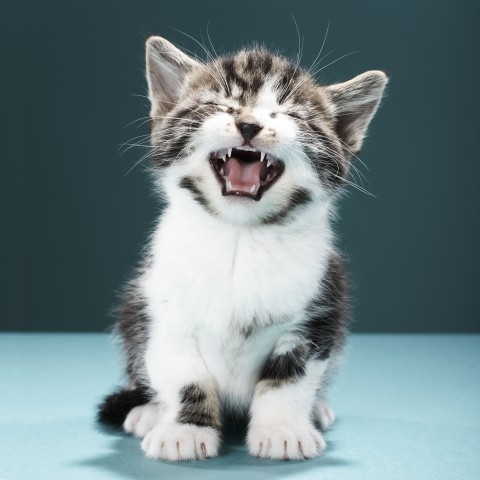
Un chaton (“Kitten”)
2. Farm Animals
Farm animals don’t vary much from one country to the next, and France is no exception. We breed the same-old cows, pigs, sheep, and goats as anywhere else in the world, which makes these words some of the most useful to learn.
The only feature you may find “exotic” about French farms is that we breed horses for their meat.
Hippophagy (the practice of eating horse meat) is generally frowned upon in the U.S., and is even banned in many states across the country. It’s met with the same disgust in the U.K., where it remains a strong taboo.
In France, it was never wildly popular, but following lots of scandals and controversies over the last two decades, the consumption of horse meat has decreased dramatically. At this rate, it shall soon become a distant nightmare for all horse-lovers.
Here are the names of common farm animals in French:
| Une vache | “Cow” |
| Un cochon | “Pig” |
| Un mouton | “Sheep” |
| Une chèvre | “Goat” |
| Un cheval | “Horse” |
| Une poule | “Hen” |
| Un coq | “Rooster” |
| Un canard | “Duck” |
| Une oie | “Goose” |
| Une dinde | “Turkey” |
- → To learn more French words and practice your pronunciation, why not stop by our vocabulary lesson on farm animals? It’s available for free on FrenchPod101.com.
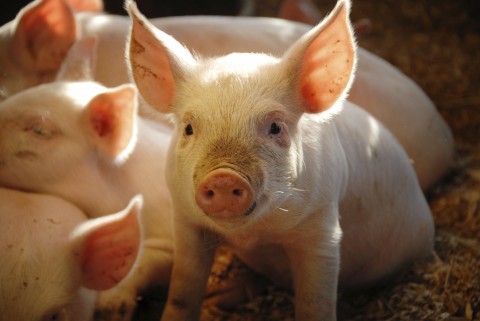
Des cochons (“Pigs”)
3. Wild Animals
French forests and mountains are home to a variety of wild animals. Rabbits and hares are the easiest to spot, but if you hike deep enough in the woods, you might encounter deer, wolves, and even bears.
If you’re more of a mountain climber, you may find some adorable groundhogs hiding from eagles and different kinds of wild goats strolling around like they own the place. The Alps are especially renowned for their wildlife, but we also have a few whales singing in the Mediterranean Sea and fluffy seals on the northern coast.
Here are the names of popular wild animals in the French language:
| Un ours | “Bear” |
| Un loup | “Wolf” |
| Un cerf | “Deer” |
| Un lièvre | “Hare” |
| Un renard | “Fox” |
| Un hérisson | “Hedgehog” |
| Un écureuil | “Squirrel” |
| Un sanglier | “Boar” |
| Une marmotte | “Groundhog” |
| Un lion | “Lion” |
| Un tigre | “Tiger” |
| Un jaguar | “Jaguar” |
| Une panthère | “Panther” |
| Un éléphant | “Elephant” |
| Une giraffe | “Giraffe” |
| Un singe | “Monkey” |
| Un gorille | “Gorilla” |
| Un kangourou | “Kangaroo” |
| Un koala | “Koala” |
| Un panda | “Panda” |
| Un paresseux | “Sloth” |
| Un phoque | “Seal” |
| Un pingouin | “Penguin” |
| Un ours polaire | “Polar bear” |
| Un morse | “Walrus” |

Un paresseux (“Sloth”)
4. Sea Animals
Counting our overseas regions (Nouvelle Calédonie, Polynésie Française, Mayotte…), France alone is home to 10% of the world’s corals. They’re mostly gathered around our islands, and they host an impressive diversity of fish, algae, and shellfish.
On the other hand, the industrialization and pollution of the French coasts have taken a huge toll on the marine ecosystem, with plastic being one of the main culprits.
| Un poisson | “Fish” |
| Un requin | “Shark” |
| Un dauphin | “Dolphin” |
| Une baleine | “Whale” |
| Un lion de mer | “Sealion” |
| Une méduse | “Jellyfish” |
| Une pieuvre Un poulpe | “Octopus” |
| There is no difference between un poulpe and une pieuvre. The latter is a bit more modern, but both are equally used. | |
| Un hippocampe | “Seahorse” |
| Un oursin | “Urchin” |
| Une étoile de mer | “Starfish” |
| Une moule | “Mussel” |
| Un concombre de mer | “Sea cucumber” |
| Sea cucumbers are so bizarrely amazing that I couldn’t resist including them on this list. Do you know of any other animal that breathes through its butt? They especially thrive in deep water, and make up 90% of life on the ocean floor below 15,000 feet. | |
- → Do you wanna dive deeper? We have a vocabulary list of marine animals and fish with recorded pronunciation examples.
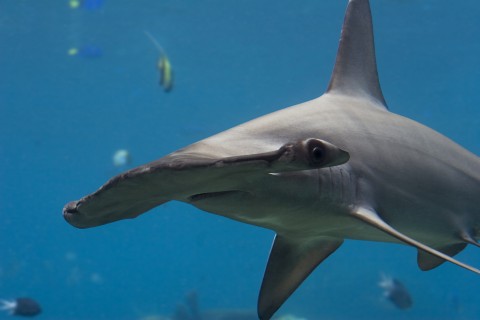
Un requin-marteau (“Hammerhead shark”)
5. Bugs
France has a diverse fauna of native and endemic bugs. Nothing as lethal and scary as what you’d find in Australia, luckily, but we have our fair share of crawling insects and nasty worms.
The three most dangerous animals in France are the Asian hornets, blood-sucking ticks, and the infamous veuve noire (“black widow”), a spider found on the island of Corsica and the region of Provence. Its venom is more dangerous than that of a cobra and can induce crazy hallucinations.
| Une abeille | “Bee” |
| Une guêpe | “Wasp” |
| Un moustique | “Mosquito” |
| Une mouche | “Fly” |
| Une araignée | “Spider” |
| Un criquet | “Grasshopper” |
| Un cafard | “Cockroach” |
| Un papillon | “Butterfly” |
| Une fourmi | “Ant” |
| Une mite | “Moth” |
| Un escargot | “Snail” |
| Une limace | “Slug” |
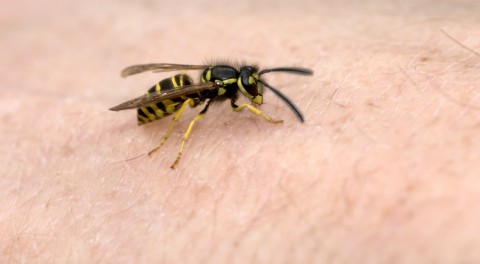
Une guêpe (“Wasp”)
6. Birds
There are more than 500 species of birds in France, but none are as familiar as our iconic pigeon.
Around 23,000 pigeons live in Paris today, but it wasn’t always so. Back in the nineteenth century, they could only be seen flying over the city. Pigeons only settled in later on, thanks to the lack of predators and the rise of the pigeon post during the Franco-Prussian War.
| Un pigeon | “Pigeon” |
| Une mouette | “Seagull” |
| Un corbeau | “Crow” |
| Un aigle | “Eagle” |
| Une colombe | “Dove” |
| Un hibou Une chouette | “Owl” |
| What’s the difference between hiboux and chouettes? Simple enough: Hiboux have fluffy ‘ears’ and chouettes don’t. Both are adorable. | |
| Une pie | “Magpie” |
| Un moineau | “Sparrow” |
| Un paon | “Peacock” |
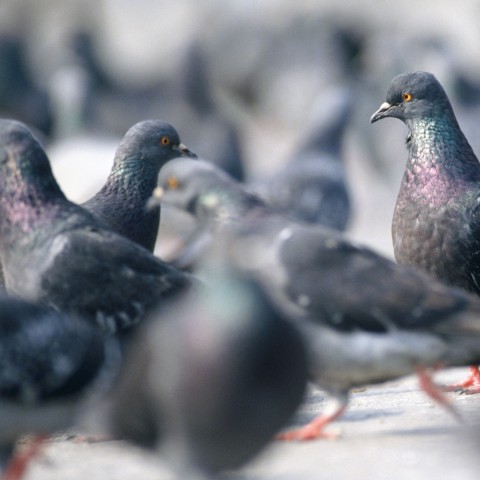
Des pigeons (“Pigeons”)
7. Reptiles & Amphibians
Although we don’t have many lethal snakes in France, we still have a few vipers hiding in the bushes here and there. However, they usually don’t attack without provocation and their venom is rarely fatal to humans.
Their natural habitat has been increasingly threatened in recent years and they’re nearly extinct today. Due to their bad reputation (much of which is derived from phobias and irrational fears), nobody’s too eager to protect them.
| Une grenouille | “Frog” |
| Un crapaud | “Toad” |
| Un crocodile | “Crocodile” |
| Un lézard | “Lizard” |
| Une tortue | “Turtle” |
| Une tortue de mer | “Sea turtle” |
| Un serpent | “Snake” |
- → For more French animal words with recordings of their pronunciation, make sure to check out this free vocabulary list on FrenchPod101.com.
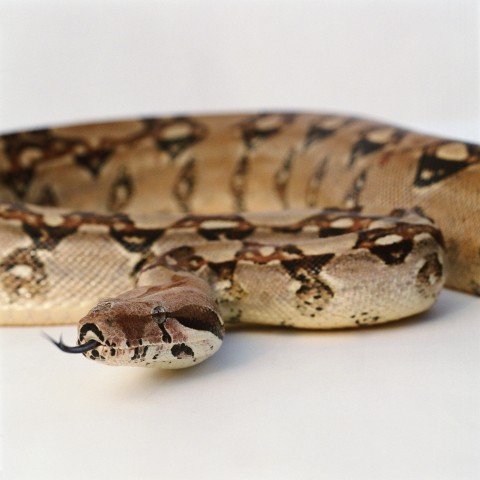
Un serpent (“Snake”)
8. Animal Body Parts
| Une queue | “Tail” |
| Un poil | “Hair” |
| Une fourrure | “Fur” |
| Une dent | “Tooth” |
| Un croc | “Fang” |
| Une griffe | “Claw” |
| Une corne | “Horn” |
| Un sabot | “Hoof” |
| Une plume | “Feather” |
| Une aile | “Wing” |
| Un bec | “Beak” |
| Une gueule | “Mouth” |
| The word gueule is also a rude slang term for “mouth,” as in the expression: Ferme ta gueule. (“Shut your trap.”) In that case, you’re implicitly comparing the other person to an animal. | |
| Une nageoire | “Fin” |
| Un tentacule | “Tentacle” |
| Une crinière | “Mane” |
| Une trompe | “Trunk” |
| Une défense | “Tusk” |
| Une antenne | “Antenna” |
| Un dard | “Dart” |
| Une patte | “Leg” |
| Une patte can only be used for animals. When talking about a human leg, we use une jambe. | |
| Une écaille | “Scale” |
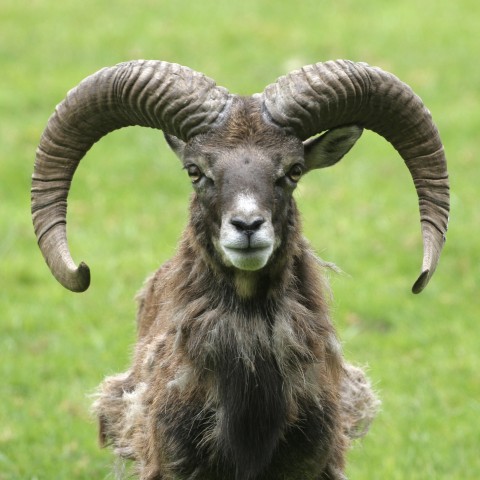
Des cornes (“Horns”)
9. Animal Verbs
| Miauler | “To meow” |
| Aboyer | “To bark” |
| Rugir | “To roar” |
| Bourdonner | “To buzz” |
| Grogner | “To growl” |
| Ronronner | “To purr” |
| Galoper | “To gallop” |
| Nager | “To swim” |
| Ramper | “To crawl” |
| Mordre | “To bite” (with teeth) |
| Piquer | “To sting” (with a dart) |
| Griffer | “To scratch” |
| Lécher | “To lick” |
| Caresser | “To pet” |
| Dresser | “To tame” / “To train” |
| Nourrir | “To feed” |
| Vacciner | “To vaccinate” |
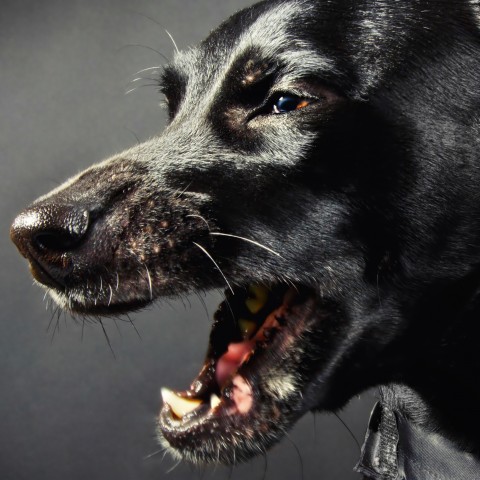
Le chien aboie. (“The dog is barking.”)
10. Animal Sounds
The onomatopoeia used for animal sounds vary greatly from one country to the next, and it’s always hilarious to see how people perceive barking or meowing in other cultures. Here are the most popular French animal sounds, for your entertainment.
But before you make fun of our animals’ sounds, just keep in mind that cats say “knavili” in Georgian, dogs go “Gaf gaf” in Russian, Danish ducks sing “Rap rap,” and Belgian turkeys gobble “Irka kloek kloek.” Just sayin’.
| Miaou | (Cat) |
| Ouaf / Wouf | (Dog) |
| Meuh | (Cow) |
| Bêêê | (Sheep) |
| Cui cui | (Bird) |
| Cocorico | (Rooster) |
| We also use this sound as a symbol of national pride. When a French person says Cocorico !, it’s pretty much like saying “Go France!” | |
| Coin coin | (Duck) |
| Grrr | (Growling sound) |
| Hou hou | (Owl) |
| Croa croa | (Toad) |
| Glouglou | (Turkey) |
| Cot cot | (Hen) |
| Groin groin | (Pig) |
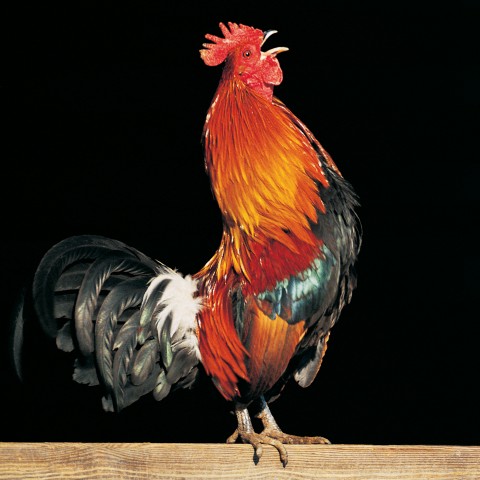
Cocorico ! (“Cock-a-doodle-doo!”)
11. Bonus: Animal Idioms
| French expression | Marcher sur des œufs |
| Literal translation | “To walk on eggs” |
| This is the equivalent of “to walk on eggshells,” when you’re being very careful not to offend someone or do anything wrong. | |
| French expression | Ça ne casse pas trois pattes à un canard. |
| Literal translation | “It doesn’t break a duck’s three legs.” |
| The equivalent of “It’s nothing to write home about,” when something is not really impressive. | |
| French expression | Oh la vache ! |
| Literal translation | “Oh, the cow!” |
| The unholy version of “Holy cow!” | |
| French expression | Vachement |
| Literal translation | “Cowishly” |
| This roughly translates to “really” or “very.” For example: C’est vachement bien ! (“It’s really good!”) | |
| French expression | Il pleut comme vache qui pisse. |
| Literal translation | “It’s raining like a pissing cow.” |
| Similar to “It’s raining cats and dogs,” when talking about heavy rain. | |
| French expression | Il n’y a pas un chat. |
| Literal translation | “There is not a cat.” |
| The place is so empty that you can’t even spot a stray cat strolling around. | |
| French expression | J’ai un chat dans la gorge. |
| Literal translation | “I have a cat in the throat.” |
| The equivalent would be “I have a frog in my throat,” when you can’t speak normally because of how dry and hoarse your throat feels. | |
| French expression | Il fait un temps de chien. |
| Literal translation | “It’s a dog’s weather.” |
| “The weather is really bad.” The expression was introduced at the beginning of the twentieth century, when dogs still had a reputation for being dirty animals. When it was pouring rain, only stray dogs would stay outside and roam the empty streets. | |
| French expression | Un trou à rat |
| Literal translation | “A rat hole” |
| A dirty or miserable place. | |
| French expression | Donner de la confiture aux cochons |
| Literal translation | “To give jam to the pigs” |
| The equivalent of “to throw pearls before swine.” To waste good things on someone undeserving. | |
| French expression | Un caractère de cochon |
| Literal translation | “A pig’s temper” |
| Do pigs have especially bad tempers? This is what the expression implies. | |
| French expression | Poser un lapin |
| Literal translation | “To put a rabbit” |
| The equivalent of “to stand someone up,” when you’re supposed to meet them but fail to show up. | |
| French expression | C’est chouette ! |
| Literal translation | “It’s owl!” |
| I’d translate it as “It’s nice,” or “It’s cool.” We use it when talking about something exciting or pleasant. For example: Ce film est chouette. (“This movie is nice.”) | |
| French expression | À vol d’oiseau |
| Literal translation | “On bird’s flight” |
| This is the equivalent of “as the crow flies.” It describes the shortest possible distance between two points that a bird could cover, flying over roads and obstacles. For example: La gare est à 2 km à vol d’oiseau. (“The train station is two kilometers as the crow flies.”) In other words: It would be further when walking, but here’s a raw estimate. | |
| French expression | Noyer le poisson |
| Literal translation | “To drown the fish” |
| Similar to “to cloud the issue,” when you make a problem more difficult to understand or deal with by introducing unnecessary ideas. | |
| French expression | Chercher la petite bête |
| Literal translation | “To look for the tiny beast” |
| The equivalent of “to nitpick,” when you focus on small, specific mistakes. A teacher might nitpick if they blame you for a missing comma in your otherwise perfect paper. | |
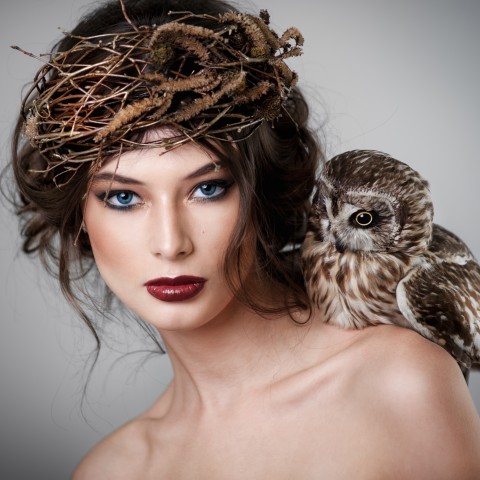
Les chouettes sont vachement chouettes ! (“Owls are super cool!”)
12. Le mot de la fin
In this guide, you’ve learned many animal names in French, from pets to marine animals and beyond. Now you’re ready to ask your friends about their pets or their favorite furry animals.
Did we forget any animal expression you’ve heard? If you know more funny French animal sounds, be sure to share them in the comments below!
Make sure to explore FrenchPod101, as we have plenty of free resources to help you practice your grammar and learn new words. Our vocabulary lists are also a great way to review words and learn their pronunciation.
Remember that you can also use our Premium PLUS service, MyTeacher, to get personal 1-on-1 coaching with your own private teacher. They can help you practice the animal words from this article, and much more. In addition to giving you assignments and personalized exercises, your teacher can record audio samples for you and review your work to help you improve in all areas.
Happy learning on FrenchPod101.com!
About the Author: Born and bred in rainy Northern France, Cyril Danon was bouncing off various jobs before he left everything behind to wander around the wonders of the world. Now, after quenching his wanderlust over the last few years, he’s eager to share his passion for languages.










